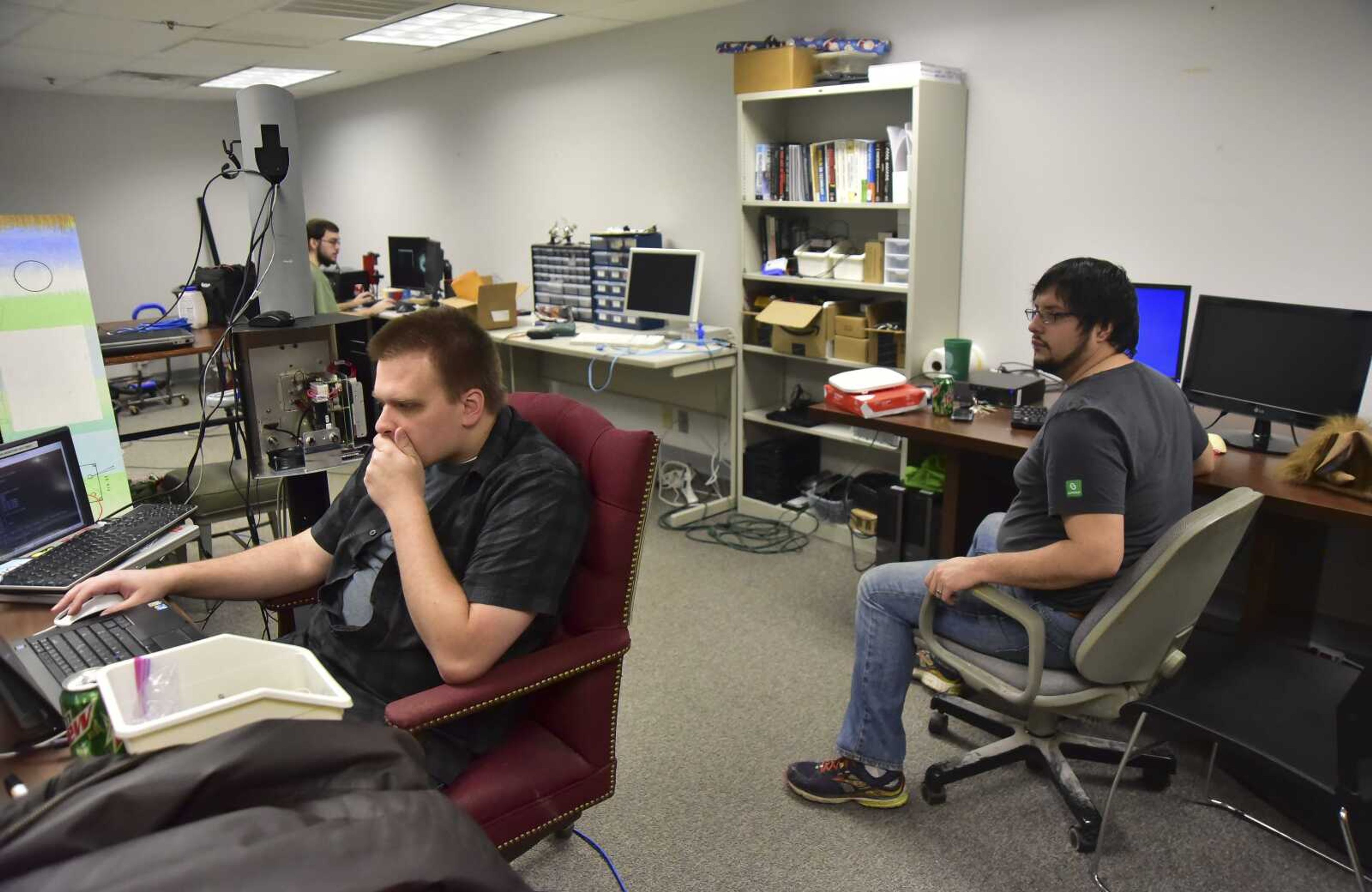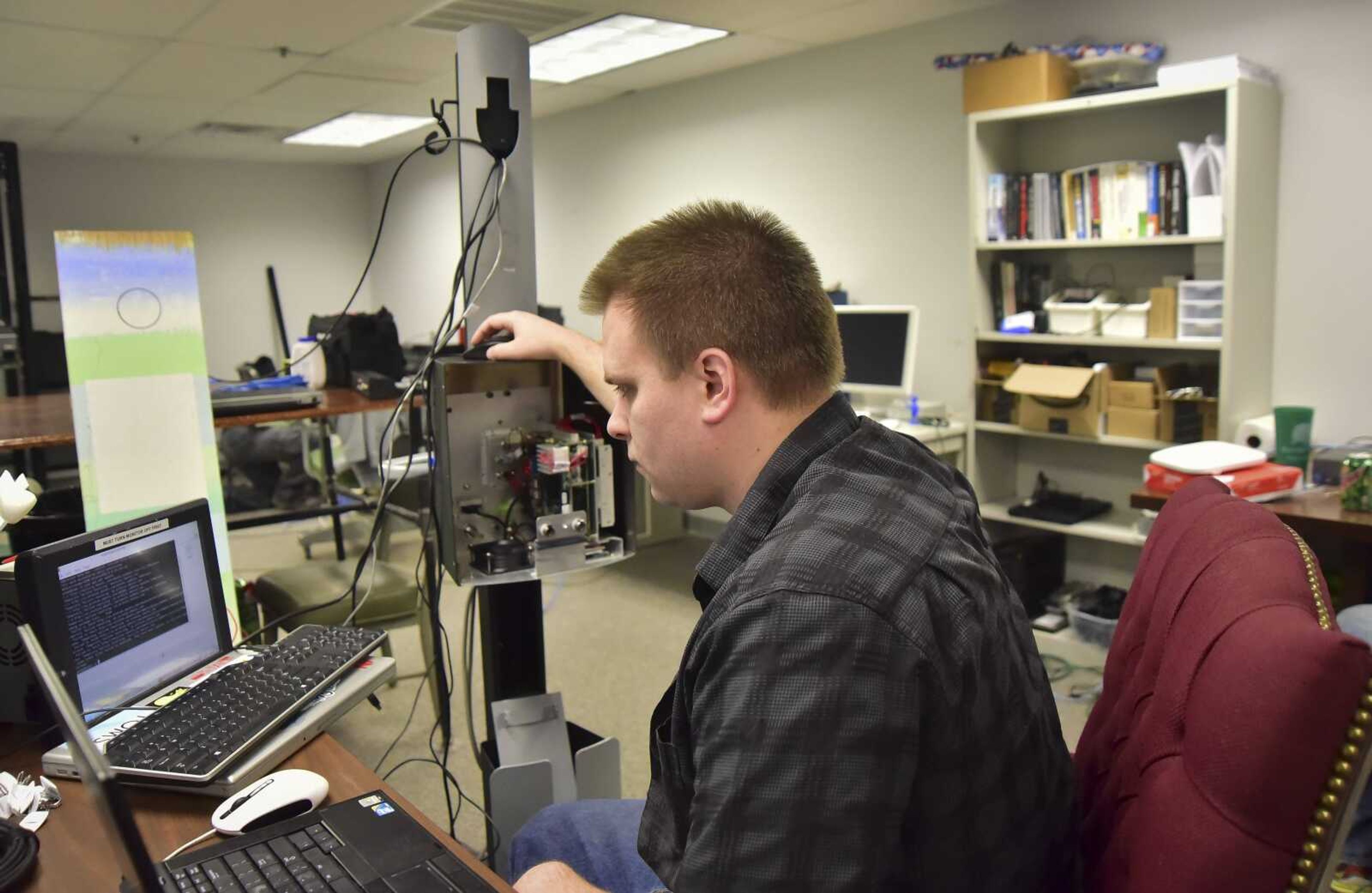Business notebook: Cape Crucible offers access to special tools
Deep in the basement of the old federal building in Cape Girardeau, there is a place. A place for the technically minded, the artistic, the creative. Rooms with resources they can use to bring their ideas to fruition. "Basically, we're Cape's first makerspace," Charlie Wallgren, a founding member of Cape Crucible said. "A place for people to come and create things using tools they wouldn't have at home, or would be expensive for a single person to buy."...
Deep in the basement of the old federal building in Cape Girardeau, there is a place. A place for the technically minded, the artistic, the creative. Rooms with resources they can use to bring their ideas to fruition.
“Basically, we’re Cape’s first makerspace,” Charlie Wallgren, a founding member of Cape Crucible, said. “A place for people to come and create things using tools they wouldn’t have at home or would be expensive for a single person to buy.”
The Cape Crucible offices clearly were a work in progress as Wallgren spoke about what they soon would have to offer. They secured the space only recently, and organizers were working quickly to get equipment set up, bearing in mind the arrival of more equipment in the coming days and months.
Cape Crucible is available to the public through a membership that provides 24/7 access to a variety of tools, from computers and wide-format and 3-D printers to woodworking and welding equipment.
A laser engraver sat on a table, waiting to be put to use.

Another founding member, Kirk Tolleshaug, pointed to a reflow oven that would allow members to solder several components together at once.
“It’s kind of like a gym membership, but instead of exercise equipment, it’s power tools and places to work on electronics, computers to do programming on — that sort of thing,” Wallgren said.
It’s a not-for-profit organization and is registered with the government, Wallgren said.
Much of the equipment they use has been donated. Local businesses such as Saint Francis Medical Center, Codefi, Big River Telephone and Broadtek have donated materials, he said, and Washington University in St. Louis has provided equipment, too.
“They’ve all been very supportive in trying to get us started,” Wallgren said. “We’ve come pretty far, considering we were just a small, ragtag group who have only been around since April.”
The founders and members of Cape Crucible also have participated in several outreach programs, working with Codefi on its Code for Kids program and teaching coding to residents at Cottonwood Residential Treatment Center.
“It was well-received,” Wallgren said. “We’re looking to do more of that sort of thing moving forward.”
The organization also plans to work with Southeast Missouri State University on its first robotics competition.
Wallgren and Tolleshaug said it offers several types of memberships.
Cape Girardeau residents can join Cape Crucible for $45 per month and receive round-the-clock access to the offices and all of the equipment. University students can have the same access for $35.
Tolleshaug said it plans to offer a membership for high-school students that likely will cost $20 per month. The reduced rate accounts for the restrictions on equipment.
“You have to be at least 18 and stuff to use the dangerous stuff,” Wallgren said.
Wallgren said the organization essentially is run by volunteers.
“At this point, we’re trying to be as reasonable as possible,” he said. “The money we make from this pays our rent and buys more equipment.”
With its new space strategically located in the heart of the city’s “tech district,” Wallgren said it’s ready to get the word out about the organization and get more people involved.
Cape Crucible holds open houses on the first and third Saturdays of each month.
“Doors are open,” Wallgren said. “And anyone who wants to can come in and check us out, work on projects, meet and greet and just have fun.”
Delta Authority offers entrepreneur fund
Southeast Missouri entrepreneurs soon will have another option when applying for grants to help fund startup businesses.
The Delta Regional Authority and IberiaBank each have provided a $1 million investment in what they call the I-Fund.
They are targeting local entrepreneurs in the eight-state Delta region and offering the chance to apply for a program which they can receive training, mentoring and capital investment.
Jeff Stinson, director of entrepreneurship for the Innovation Hub at Winrock International, a not-for-profit organization involved in the program, said two cohorts made up of 25-25 startups or entrepreneurs, referred to as “teams,” will work parallel with each other, each receiving training through a virtual 12-week program.
“Each team will receive up to $50,000,” Stinson said. “They receive $5,000 just on acceptance.”
After a pitch midway through the course, the team can receive up to $20,000 more, based on the project. An additional $25,000 will be available at the end.
“This strategic investment aligns with our core mission — creating jobs, building communities and improving lives by making the Delta an innovative hub for the startup leaders of tomorrow,” DRA chairman Chris Masingill said in a news release. “I’m proud to work with Winrock International and our partners to invest in the future of the Mississippi Delta region. With the Delta I-Fund, we’re breaking new ground — both here at the DRA and throughout the Delta region.”
A website about the I-Fund is in development.
Business licenses
- XOXO Exclusive is a home-based business owned by Debbie Ebaugh that specializes in event planning.
- CarGO, 335 Broadway, Suite 601, is an on-demand transportation network company owned by CarGO Cape Girardeau, Missouri, LLC. The anticipated opening date was Dec. 20.
- John Mark Photography LLC, is a commercial and individual photography business owned by John Mark Marshall.
- Mixing 10, a bar on 2 N. Main St., has changed owners. It now is owned by Matthew J. Hotop. It previously belonged to David Creech, president of Diamond Wireless Inc.
bbrown@semissourian.com
(573) 388-3630
Pertinent address:
339 Broadway, Cape Girardeau, MO
Connect with the Southeast Missourian Newsroom:
For corrections to this story or other insights for the editor, click here. To submit a letter to the editor, click here. To learn about the Southeast Missourian’s AI Policy, click here.










